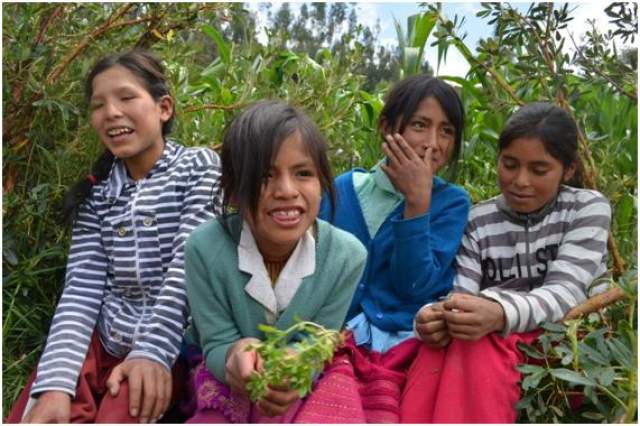A helpful education for life

Students at the Chaupin school grow medicinal herbs, vegetables, native seeds and fruits. (Photo: Maritza Baltazar)
“Sometimes we say that the children come [to school] without knowing anything… Of course, they have no Western knowledge, but they have a deep understanding of their area,” said rural teacher Miriam Vitorio Apolinario.
Vitorio Apolinario works at the private Chaupin school, in the hamlet of Baños de la Merced in Peru’s central department of Ancash. The school is known as a “Center of Andean Knowledge,” and was created eight years ago by the Asociación Hijos Sanadores de la Tierra Madre, or HISATIMA, which translates to the Association of Mother Earth’s Children-Healers. Its founders — Mariela Javier Caldua, Wenceslao Rosario Solano, Giovana Vitorio Apolinario and Miriam Vitorio Apolinario — are teachers dedicated to Andean culture, aiming to reestablish its value and concretize its identity as an ancient but living culture.
HISATIMA proposes free schooling from first through sixth grades in a multi-grade classroom to provide an education more relevant for children in the Andean highlands that values local expertise and culture, integrating Western and Andean knowledge. It’s financed by cooperating institutions, and funds are raised months ahead of the coming school year.
“For four years I have had the opportunity to work with children in the field,” says Vitorio Apolinario. “It’s very nice, we make sure their knowledge is embodied, respected, starting with language, their way of being, of living, and this is brought to the curriculum, where every month we integrate in every subject the most important farming and cultural activities of the community calendar,” said Vitorio Apolinario.
“Here what we do is work on the children’s knowledge and the teachers’ knowledge; thus we acquire new knowledge to improve teaching and learning for the children,” she added.
Affirmation of Andean culture for the Good Living
Teacher Pablo Díaz Tarazona, who heads early education at the school for 3- and 4-year olds, explained he starts by teaching them what is tangible and what is abstract. The children learn by touching, feeling, and using their senses; then later, they are taught how to think more abstractly.
The school has a small farm where Andean culture is lived out, a way to relate as a large family to nature, deities, and other humans, and live in harmony, which is the foundation of the Good Living. This experience is an emotional relationship, through mutual care for the regeneration of life. If the children sow their little farm, it will repay them with diverse foods for the Good Living.
The children learn to respect Mother Earth throughout the entire crop cycle; they practice traditional values like reciprocity, respect, caring, ritual, and collective and communal work.
Rural teachers at this school support Andean culture by incorporating practices, ancestral knowledge, and community activities so that the children are proud of it. This increases their self-esteem, reaffirms their cultural identity, and values the Andean cosmovision.
The fifth and sixth grade students speak fluent Quechua, share their knowledge, relate what they learned about the human body using illustrations on science and environment, and simulate a market to buy and sell goods to put their math skills into action.
To speak about local knowledge, they move to the school’s farm because everything has its place and time.
In previous years, they planted tubers like potato, oca and olluco, as well as pumpkin and native corn. This year they have planted various medicinal herbs. Edika Berrospi Torres, a sixth grader, explained how “when we have a stomach ache, we boil mint and anise, we drink it, and it alleviates the pain.”
They also grow vegetables like beets, lettuce, and green onions, and when they harvest the crop, they each take some home and the remainder is used for breakfast at school.
They know the geographic boundaries of Baños de la Merced, and its neighboring towns and communities.
Andean signs
The community believes that the hill that protects them is grandfather Qotupachan, and so students make offerings in ceremonies dedicated to him, asking him to watch over their crops and help them in school.
The students know the Andean signs, known as bio-indicators; for example, pigeons flying high overhead is a harbinger of heavy rain, or planting crops at the new moon must be avoided to yield a better harvest.
They also learn values. Karin Cornelio Llanque, a fifth grader, said, “When we see an animal in our farm, we alert its owner to remove it, when we see a grandmother picking alfalfa, we should help her, and at meal time we share our snack with everyone.”
Every activity carried out on the school’s farm is according to Andean culture; the diversity, ritual, equality, inclusion and regeneration of life are demonstrated through the care for plants, the earth, water, the environment, and animals. Back in the classroom, those life experiences are translated into texts.
Source: Latinamerican Press
Related Project:

Indigenous Education
We support the propagation of education that is developed in indigenous territories; rooted in the knowledge systems and practices of the ancestors; and helping communities address the challenges of today.
Categories
Latest news
- LifeMosaic’s latest film now available in 8 languages
- การเผชิญหน้ากับการสูญพันธุ์ และการปกป้องวิถีชีวิต (Thai)
- LANÇAMENTO DO FILME BRASIL : Enfrentando a Extinção, Defendendo a Vida
- Enfrentando la Extinción, Defendiendo la Vida (Español)
- Peluncuran video baru dalam Bahasa Indonesia : Menghadapi Kepunahan, Mempertahankan Kehidupan


